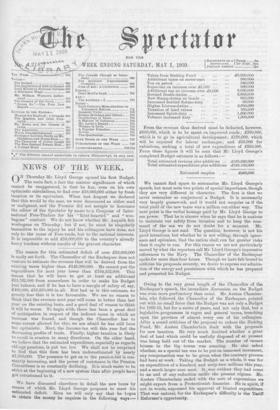Owing to the very great length of the Chancellor of
the Exchequer's speech, the immediate discussion, on the Budget was even more perfunctory than usual. Mr. Austen Chamber- lain, who followed the Chancellor of the Exchequer, pointed out with no small force that the Budget was not only a Budget for 1909-10, but for a series of years, and not only that, but a legislative programme in vague and general terms, trenching upon the province of almost every one of his colleagues. After a sound criticism of the proposal to reduce the Sinking Fund, Mr. Austen Chamberlain dealt with the proposals for new taxation. He very much doubted whether a great deal of land which could be usefully disposed of at present was being held out of the market. The number of vacant houses in the big towns was amazing. He also asked whether, as a special tax was to be put on unearned increment, any compensation was to be given when the contrary process had been at work. Taking• the Budget as a whole, it was for an expenditure of a hundred and sixty-two millions this year, and a much larger sum next. It4was evident they had come to an end of any reduction under the present regime. Mr. Austen Chamberlain ended with the sort of expressions we might expect from a Protectionist financier. He in spirit, if not in words, expressed his approval of bloated expenditure. That was natural, for the Exchequer's difficulty is the Tariff Reformer's opportunity.










































